
Launch of PostGenAI@Paris: AI at the Heart of a Scientific and Societal Ambition
On April 1, 2025, Sorbonne University and its partners officially launched PostGenAI@Paris. Located in the heart of Paris, this interdisciplinary and cross-sector consortium aims to foster the emergence of ethical, inclusive, and sovereign AI, fully anchored in the major challenges of our time.
At the Réfectoire des Cordeliers, in front of nearly 300 guests, the inauguration of PostGenAI@Paris marked a turning point for the French AI ecosystem. Led by Sorbonne University through its SCAI cluster (Sorbonne Cluster for AI), this new consortium brings together 16 academic partners and more than 60 industrial partners, in a resolutely collaborative approach.
“This evening marks an important moment, as it celebrates the achievement of our AI cluster – SCAI – which now becomes the heart and driving force of a large-scale consortium with unique scientific potential,” declared Nathalie Drach-Temam, President of Sorbonne University, during the event's opening.
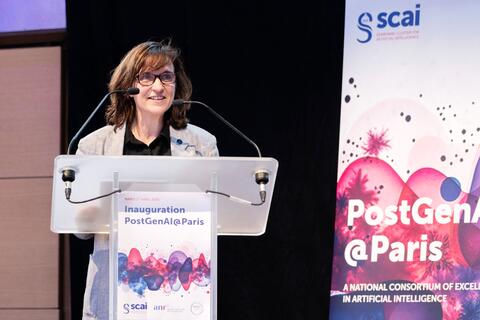
Discours de la présidente de Sorbonne Université ©Sorbonne Université
A Structuring Ambition in Service of Society
PostGenAI@Paris is one of the winners of the “IA-Cluster” call for expressions of interest from the French National Research Agency (ANR), supported with €35 million in funding over five years under the France 2030 plan. Its ambition: to establish an international reference hub for post-generative artificial intelligence in Paris, capable of addressing the scientific, ethical, and societal challenges posed by this technological revolution.
“Artificial intelligence is now everywhere: in science, industry, and society. It’s redefining how we conduct research, transforming our pedagogy, our practices, our institutions,” emphasized Gérard Biau, Director of SCAI, in his opening speech. “We must accompany this evolution, imagine new ways of teaching, transmitting, and producing knowledge.”
This message resonated throughout each of the evening's speeches: AI cannot be separated from its applications. Its development must be accompanied by rigorous reflection, ethical grounding, and a strong commitment to sharing with both citizens and decision-makers.
“AI offers tremendous opportunities to address the major issues of our time. But we must support its development with a better understanding of what it is – and what it is not,” reminded the President of Sorbonne University. “Our responsibility is therefore to deepen our reflective approach to AI’s uses and apply the rigor and ethics of the scientific method.”
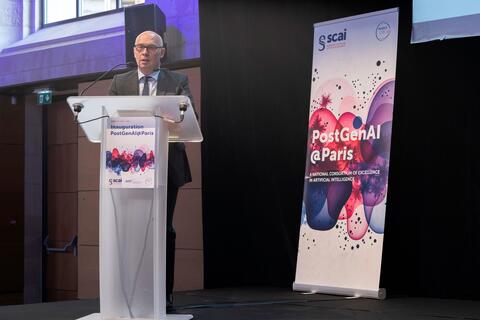
Discours de Gérard Biau, directeur de SCAI ©Sorbonne Université
An Evening of Art, Science, and Dialogue
To showcase AI’s creative potential, the evening began with an immersive experience blending technology and art. Obvious, a trio of pioneering AI artists, presented a video entirely generated by AI. This dreamlike, multisensory, and multidimensional journey explored the territories transformed by AI—from fundamental physics to visual arts, medicine, law, and cultural imagination.
Next came a keynote by philosopher and mathematician Daniel Andler, who stressed the essential role of the humanities and social sciences in understanding and using AI. Philosophy, he emphasized, plays a key role: “Through its branches – philosophy of science, mind, language, ethics... – it acts as the 'gadfly', highlighting tensions and controversies, and revealing the vitality of a constantly evolving field.”
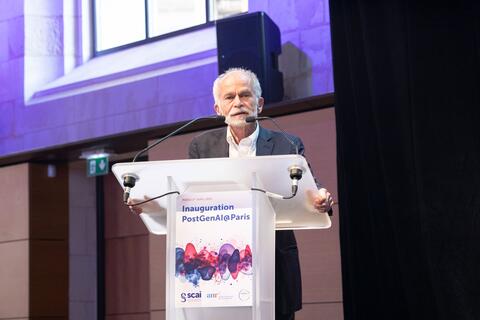
Conférence inaugurale du philosophe et mathématicien Daniel Andler ©Sorbonne Université
His remarks opened the floor to a panel discussion featuring experts from academia, applied research, and education:
- Bruno Sportisse, CEO of Inria
- Muriel Touaty, Partner Education – Research & Innovation at Onepoint
- Jean-Philippe Cointet, Professor of Sociology and Director of the Free Institute for Digital Transformations at Sciences Po
These conversations blended scientific, industrial, and policy perspectives on AI, illustrating the richness of an interdisciplinary ecosystem embodied by the consortium’s diversity.
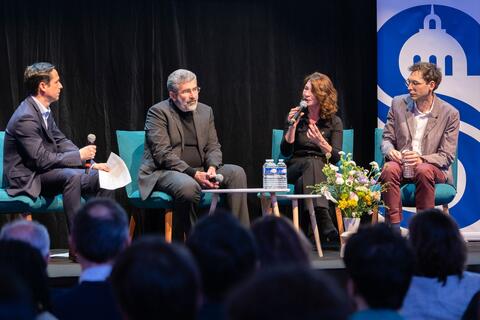
Table ronde avec Bruno Sportisse, Muriel Touaty et Jean-Philippe Cointet ©Sorbonne Université
A Consortium at the Intersection of Disciplines
“With PostGenAI, we now unite a community that goes beyond academic boundaries,” stated the President of Sorbonne University.
“The challenge for our cluster is substantial: it’s about enabling 16 academic and institutional partners and over 60 industrial partners to work together,” added Gérard Biau. “Behind these numbers are talents, ideas, and ambitious projects just waiting to converge and grow together.”
Led by Sorbonne University, PostGenAI@Paris brings together members of the Sorbonne University Alliance (Sorbonne University, UTC, MNHN, INSEAD, CNRS, Inria, INSERM, IRD) and other major institutions with complementary expertise, such as AP-HP, Paris-Panthéon-Assas University, CNAM, Sciences Po, the Court of Cassation, IRCAM, IEA, ONERA, the Paris Mathematics Foundation, and the Economic, Social and Environmental Council.
“Innovation never happens in silos. It’s the fruit of collective work, ongoing dialogue between disciplines, sectors, and curious, passionate minds,” emphasized Gérard Biau. “Our cluster’s success depends on our ability to transform this tremendous diversity into a dynamic ecosystem—where research and innovation feed off each other, where knowledge circulates, and where everyone can find their place.”
This cross-sector approach is embodied in 21 Collaborative Acceleration Programs (PACs) that integrate research, education, and innovation, structured around three main themes:
- Generative AI and Disruptive Technologies – with applications in engineering, fluid modeling, and robotics.
- Health and Desirable Futures – in partnership with AP-HP and the Quinze-Vingts National Hospital, including robotic surgery and deep learning in healthcare.
- Resilient Society and Education – with projects in justice, geointelligence, and augmented pedagogy.
Showcasing AI in Action
During the event, guests explored various demonstrators highlighting the consortium’s advancements:
- Heudiasyc Lab (UTC) unveiled a real-world test on a key autonomous vehicle challenge: roundabout merging.
- Obvious offered Portal, an interactive real-time AI generation experience.
- ISIR (Intelligent Systems and Robotics Institute) presented a robotic manipulation demo accessible to non-experts.
- Beink showcased Beink Dream, a visual collaboration platform turning images into a universal language.
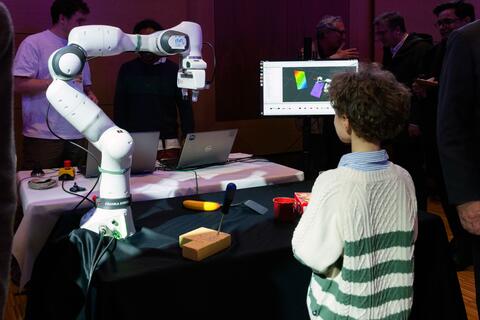
Démonstrateur de l'ISIR ©Sorbonne Université
A Community United for a Shared Future
The launch of PostGenAI@Paris laid the foundation for an ecosystem at the crossroads of disciplines, sectors, and perspectives. By bringing together fundamental sciences, industrial actors, cutting-edge technologies, healthcare, the humanities, and societal concerns, PostGenAI@Paris positions itself as a model to address society’s profound transformations.
“Today we celebrate an important milestone—but it’s also a new beginning. So let’s continue to build, innovate, and dream together,” concluded Gérard Biau.
Driven by this collective momentum, Sorbonne University and its partners intend to make PostGenAI a key player in European scientific and technological sovereignty, and a lever to envision—and build—a future where AI truly serves the common good.
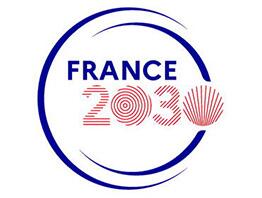
France 2030
The project is supported by the French National Research Agency (ANR) as part of the France 2030 government investment plan deployed by the General Secretariat for Investment (SGPI).
